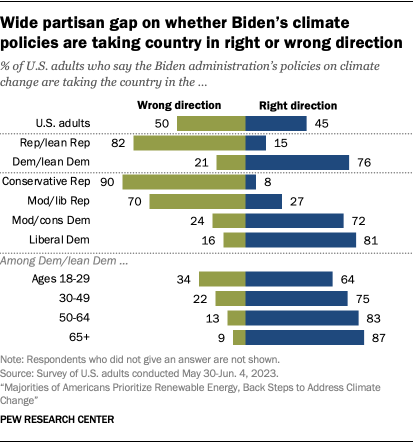
On balance, slightly more Americans say the Biden administration’s policies on climate change are taking the country in the wrong direction (50%) than the right direction (45%). As with most assessments of the administration, Republicans and Democrats offer opposing viewpoints on this question.
Climate change action has been a central goal of Biden’s administration. In 2022, he signed the Inflation Reduction Act into law, which included a host of policies designed to address climate change. The administration has also proposed EPA rules to address carbon emissions, such as requiring power plants to eliminate emissions by 2040 and requiring oil and gas companies to seal methane leaks.
The administration has also moved forward with oil and gas projects, including the approval of the Willow drilling project in Alaska that attracted criticism from environmental activists.
About three-quarters of Democrats and those who lean to the Democratic Party (76%) say the Biden administration’s climate policies are taking the country in the right direction. Among Republicans and Republican-leaning independents, 82% say Biden is moving the country in the wrong direction. These numbers are little changed since the question was last asked in May 2022.
Democrats’ views differ by age. Younger Democrats offer less support for the administration than older Democrats. Among Democrats ages 18 to 29, 64% say Biden’s climate policies are moving the country in the right direction, compared with 87% among Democrats ages 65 and older.
About three-quarters of Democrats approve of Biden’s direction on climate but many among this group think he could be doing more
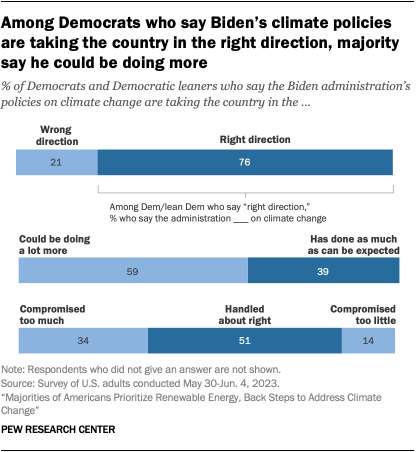
Among the 76% of Democrats who say that Biden’s climate policies are moving the country in the right direction, the survey finds signs that this constituency is not completely satisfied with the administration’s efforts.
A majority (59%) of this group says that the Biden administration could be doing a lot more on climate change, while 39% say it has done as much as can be expected.
Among Democrats who say Biden’s climate policies are moving the country in the right direction, 51% think he’s handled compromise on climate policy about right, but 34% say he’s compromised too much. Another 14% say he’s compromised too little.
Most Liberal Democrats (81%) are in alignment with Biden on the direction of climate policy. Even so, among liberals who say his policies are moving the country in the right direction, 66% think he could be doing more and 44% say he has compromised too much on climate.
Public support for policies to address climate change
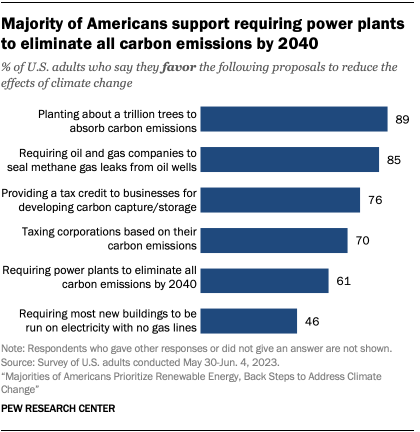
Americans’ support for action on climate change is reflected in their views of some specific policy proposals.
Roughly nine-in-ten (89%) favor planting about a trillion trees to absorb carbon emissions. Large majorities also favor requiring oil and gas companies to seal methane gas leaks from oil wells (85%), providing a tax credit for businesses for developing carbon capture and storage (76%) and taxing corporations based on their carbon emissions (70%).
A somewhat smaller majority of Americans support requiring power plants to eliminate all carbon emissions by 2040 (61%).
Requiring most new buildings to be run on electricity with no gas lines receives the least support of the items included in the survey: 46% favor this idea while 51% oppose it.
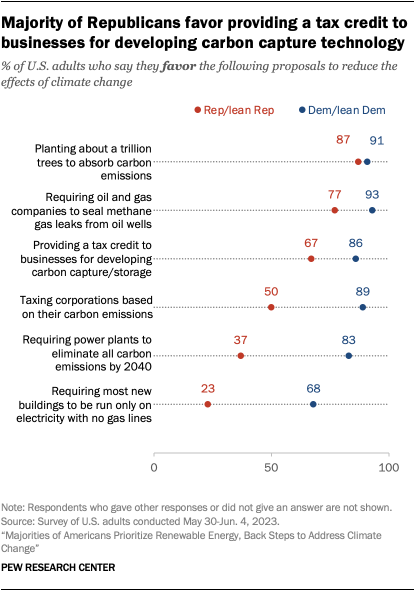
Large shares of Democrats and Republicans support planting about a trillion trees to absorb carbon emissions (91% and 87%, respectively).
Majorities of both parties also support requiring oil and gas companies to seal gas leaks from oil wells and providing a tax credit to businesses for carbon capture and storage, though Democrats are still more likely than Republicans to support these proposals.
On other climate proposals, partisans are more divided. About nine-in-ten (89%) Democrats favor taxing corporations based on their carbon emissions, compared with half of Republicans.
And while majorities of Democrats support requiring power plants to eliminate carbon emissions by 2040 and requiring most new buildings to be run only on electricity, these proposals garner more opposition than support among Republicans.
Protecting the environment and low consumer costs are important considerations for the public in climate proposals
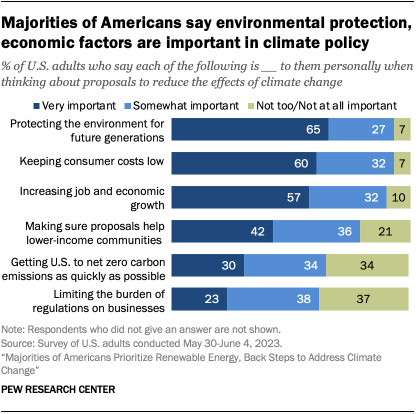
When asked what’s important to them in proposals to reduce the effects of climate change, 65% of Americans say protecting the quality of the environment for future generations is a very important factor. Economic considerations also feature prominently: 60% say keeping consumer costs low is a very important consideration to them in climate proposals and 57% say increasing job and economic growth is very important to them.
Smaller shares place the highest level of importance on making sure climate proposals help lower-income communities (42% very important) or getting the U.S. to net zero carbon emissions as quickly as possible (30%). Just 23% say that limiting the burden of regulations on businesses is very important to them personally when considering proposals to reduce the effect of climate change.
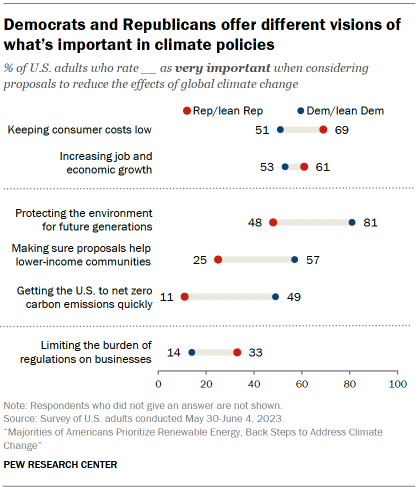
Partisans have differing priorities when it comes to climate change proposals.
Among Democrats, protecting the quality of the environment for future generations is their clear top consideration (81% say this is very important), followed by making sure proposals help lower-income communities (57%).
About half of Democrats say increasing jobs and economic growth (53%) and keeping consumer costs low (51%) are very important considerations to them personally.
By comparison, Republicans place greater emphasis on economic factors: 69% say keeping consumer costs low is a very important consideration to them in climate proposals and 61% say increasing job opportunities and economic growth is very important. Protecting the environment for future generations is seen as a very important consideration by 48% of Republicans.
Majority of Americans support U.S. participation in international climate efforts
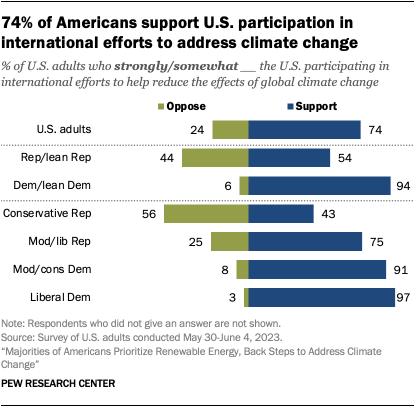
In a global context, Americans offer broad support for U.S. involvement with international efforts to deal with climate change. But there’s less consensus about how big a role the U.S. should play compared with other countries with large economies.
Overall, 74% support the U.S. participating in international efforts to help reduce the effects of climate change; just 24% say they oppose this.
An overwhelming share of Democrats (94%) back U.S. engagement with international efforts to address climate change. Views are less one-sided among Republicans; still, a narrow majority (54%) say they support this, while 44% are opposed.
There are sizable gaps within the GOP on this question. A majority of moderate and liberal Republicans (75%) support U.S. participation in international climate efforts. By contrast, 56% of conservative Republicans say they oppose this. Across age groups, younger Republicans ages 18 to 29 (71%) and 30 to 49 (58%) are more likely to support U.S. global efforts than Republicans ages 50 and older (48%).
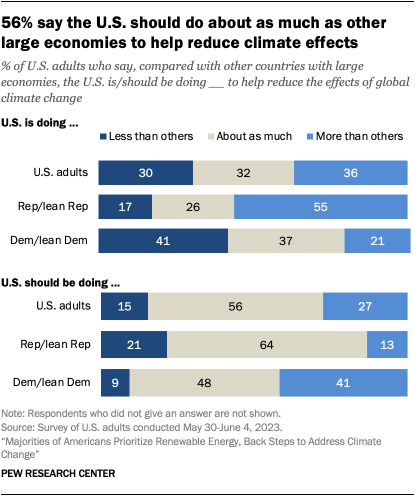
The public is divided over how much the U.S. is currently contributing to global efforts to deal with climate change. Overall, 36% think the U.S. is doing more than other countries with large economies to reduce the effects of climate change, compared with 32% who say the U.S. is doing about as much as others and 30% who think the U.S. is doing less than others.
Since January 2022, there’s been a modest 4-point increase in the share of Americans who say the U.S. is doing more than other countries with large economies to deal with climate change and a corresponding 6-point decline in the share saying the U.S. is doing less than others.
There’s more agreement among Americans when it comes to the role the U.S. should play internationally on climate change. Overall, 56% say the U.S. should do about as much as other countries with large economies to reduce the effects of global climate change. About a quarter (27%) say the U.S. should do more than other large economies, while 15% think it should do less.
Among Republicans, 55% think the U.S. is currently doing more than other countries with large economies to address climate change. As for the country’s appropriate role, 64% of Republicans think it should do about as much as other large economies to address the issue. Democrats hold varied perceptions of how much the U.S. is currently doing: 41% say it is doing less than other large economies to reduce the effect of global climate change, while 37% say it is doing about as much as others and 21% think the U.S. is doing more than other countries with large economies. There’s also no consensus among Democrats over how much the U.S. should do.
Close to half (48%) think the U.S. should do about as much as other large economies to deal with the issue, but 41% think the U.S. should do more than others. A small share (9%) think the U.S. should do less than other countries with large economies.
Just 33% of Americans believe the U.S. and other countries around the world will do enough to avoid the worst impacts from climate change
Americans are not especially optimistic that efforts to address climate change will stave off its most serious impacts. A narrow majority (54%) say the U.S. and other countries around the world will probably or definitely not do enough to avoid the worst impacts of climate change. A much smaller share (33%) think the U.S. and others will likely do enough to avoid the worst impacts. About one-in-ten (11%) say they don’t believe climate change impacts are a problem.
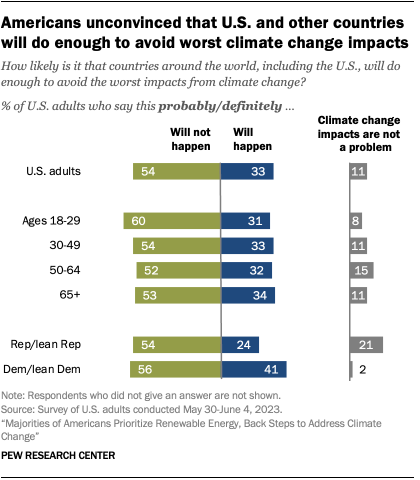
Republicans are significantly more likely than Democrats to say climate change impacts are not a problem (21% vs. 2%), but neither group is particularly optimistic that the U.S. and other countries around the world will do enough to avoid the worst impacts from climate change. Young Democrats are particularly skeptical. A majority (64%) of Democrats ages 18 to 29 say the U.S. and other countries are unlikely to do enough to avoid the worst climate impacts. Older Democrats tend to be more evenly divided in their outlook on this question.
How Americans see the federal government’s role in communities at high risk of extreme weather
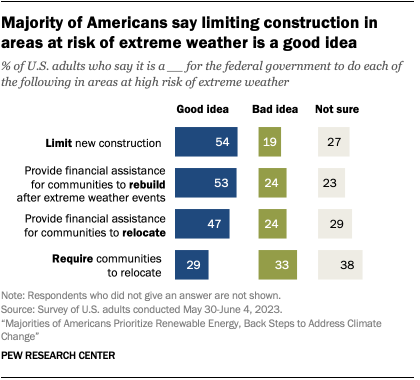
Extreme weather events, such as floods or droughts, are expected to become more frequent and intense in coming years due to climate change. Communities at high risk of these events face questions about how to confront challenges from extreme weather, including what role government should play.
Overall, 54% of Americans think it is a good idea for the federal government to limit new construction in communities at high risk of extreme weather, while 19% say this is a bad idea and another 27% are unsure. About half (47%) say it’s a good idea for the federal government to provide financial assistance for communities in high-risk areas to relocate; fewer (24%) call this a bad idea.
At the same time, the public is generally supportive of a federal role to help communities in high-risk areas rebuild: 53% say that it is a good idea for the government to provide financial assistance for communities to rebuild after an event occurs, compared with 24% who call this a bad idea.
There’s little enthusiasm for the federal government requiring communities to relocate from high-risk areas: 29% of U.S. adults say this is a good idea, compared with 33% who say it’s a bad idea and 38% who say they aren’t sure.
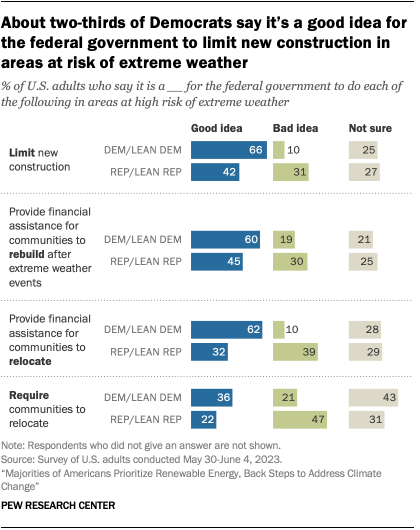
Democrats are more supportive than Republicans of the federal government playing a role in communities at high risk of extreme weather.
About two-thirds of Democrats say it would be a good idea for the federal government to limit new construction in areas at high risk of extreme weather. Views among Republicans are more mixed: 42% say this is a good idea, compared with 31% who say it’s a bad idea and 27% who say they’re not sure.
About six-in-ten Democrats (62%) say it’s a good idea for the federal government to provide financial assistance for communities to relocate from areas at high risk of extreme weather. By contrast, Republicans are more likely to view this as a bad than good idea (39% vs. 32%).
While Democrats support federal efforts to limit construction and incentivize relocation, they also support federal assistance to help communities rebuild after extreme weather events. Overall, 60% of Democrats think it’s a good idea for the federal government to financially assist communities with rebuilding after extreme weather events, compared with just 19% who say this is a bad idea. Among Republicans, 45% say this is a good idea, while 30% call it a bad idea and 25% say they’re not sure.
Neither partisan group is particularly supportive of the federal government requiring communities at high risk of extreme weather to relocate, though a somewhat larger share of Democrats (36%) than Republicans (22%) says this is a good idea.
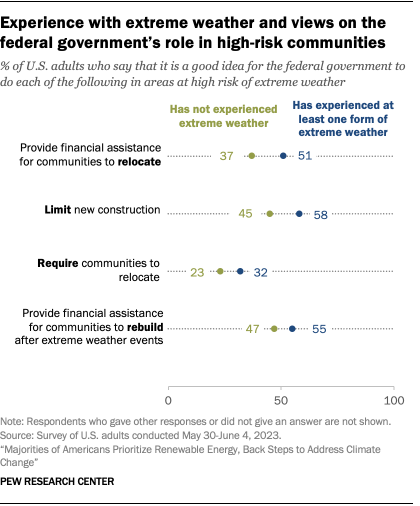
There are some differences in views about the federal government’s role in communities at high risk of extreme weather between those who say they’ve experienced an extreme weather event themselves and those who say they have not.
For instance, 51% of those who say their area has faced an extreme weather event recently think it’s a good idea for the federal government to provide financial assistance to communities at high risk to relocate, compared with 37% of people who have not experienced an extreme weather event in the last year.
Experiences with extreme weather
A majority of Americans (69%) say they have experienced at least one of five types of extreme weather in their own community over the last year. Long periods of unusually hot weather and severe weather, like floods or intense storms, have been experienced by 45% and 44% of Americans, respectively. A third say they’ve experienced droughts or water shortages, while fewer say they have experienced major wildfires (18%) or rising sea levels that erode beaches and shorelines (16%).
These reports of extreme weather differ across regions in the country. The biggest differences are in the experiences of major wildfires – 46% of adults living in the West say they have experienced these in the past year compared with no more than 10% of adults living in other regions. Adults in the West are also the most likely to have experienced droughts or water shortages.
Partisanship also plays a role in perceptions of extreme weather. Democrats are more likely than Republicans to report their community has experienced extreme weather, a difference that holds when looking at people who live in the same geographic region.
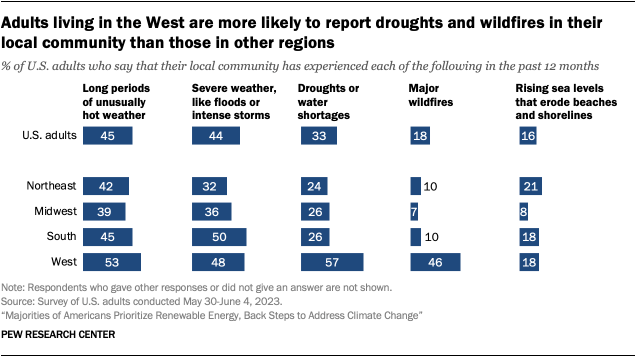
Most Americans who have experienced extreme weather events see a connection to climate change
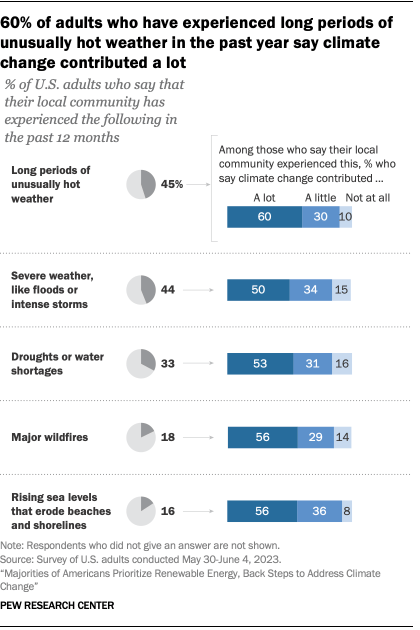
Among adults who report experiencing a form of extreme weather in the last year, most say climate change has contributed a lot or a little to these events.
For example, 90% of adults who have experienced long periods of unusually hot weather in the past year say that climate change contributed a lot (60%) or a little (30%) to this.
Similarly, more than eight-in-ten of those who have experienced coastal erosion, major wildfires, droughts and severe weather like floods or intense storms believe climate change has contributed to these events.
Majorities of Democrats and Republicans who report experiencing extreme weather within the last year believe that climate change has contributed to these events. However, larger majorities of Democrats than Republicans take this view and Democrats are much more likely than Republicans to think climate change has contributed a lot.
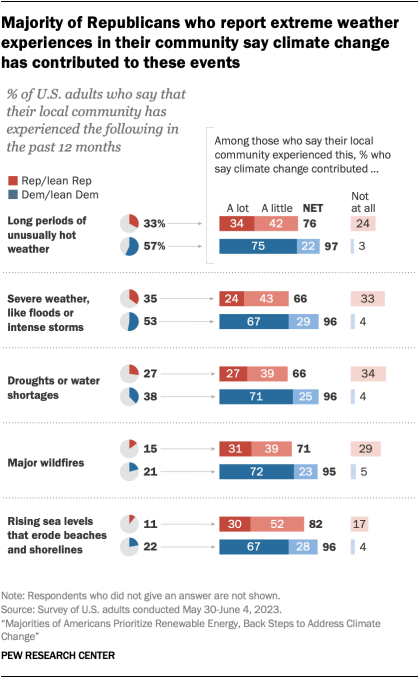
For instance, nearly all Democrats who have experienced long periods of unusually hot weather in the last year believe climate change has contributed at least a little to this, including 75% who think it has contributed a lot.
Among Republicans who say their community has experienced long periods of unusually hot weather, 76% think climate change has contributed at least a little to this, including 34% who say it has contributed a lot.
Perceptions of climate change’s impact on extreme weather are roughly similar to those measured a year ago in May 2022, the last time the Center asked these questions.




